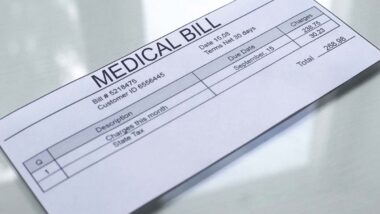Top Class Actions’s website and social media posts use affiliate links. If you make a purchase using such links, we may receive a commission, but it will not result in any additional charges to you. Please review our Affiliate Link Disclosure for more information.
Dealing with the repercussions of a car crash can be challenging, particularly if the crash was severe enough to total the vehicle.
It is important for car owners who may have totaled their vehicle to understand what determines the total loss of a vehicle, how insurance companies determine total loss, and how to determine the total loss value of a vehicle themselves to make sure they’re being adequately compensated.
What Is a Total Loss Claim?
So what determines the total loss of a vehicle? The ball is in the insurance company’s court.
Sometimes, how an insurance company determines total loss can be confusing. Indeed, criteria used by insurance companies to determine if a vehicle has been totaled depends on the state.
Different states have different rules about how to calculate a total loss value. However, a vehicle is usually considered totaled when repair costs are above 50 percent to 75 percent of the vehicle’s cash value, according to Carfax.
What Happens When You Total a Car?
If someone gets into an accident and their car is damaged, the first thing to do is make sure they and their passengers are not injured. Then, it is important for the driver to call their insurance provider as soon as possible.
The insurance company will usually send an adjuster to evaluate the damage to the vehicle. The adjuster will determine if the damage was extensive enough to consider the vehicle a total loss.
Additionally, the insurance adjuster will determine the amount of compensation for which the policy holder is eligible. In the case of a total loss claim, the insurance adjuster will calculate total loss value.
If a car is considered totaled, it will be given a salvage title.
How Do Insurance Companies Calculate Total Loss Value?
The method to calculate total loss value isn’t uniform for all 50 states, though generally speaking how insurance determines total loss is if the damage is at least 50 percent to 75 percent percent of the vehicle’s value, the car will be considered totaled.
However, 21 states do not have a specific percentage at which a vehicle is considered totaled and instead companies use a total loss formula to calculate total loss value. This formula is often the cost of the repairs to the vehicle plus the scrap value of the vehicle.
If this number is equal to or greater than the actual value of the vehicle, the insurance adjuster will deem it totaled.
Some insurers using this formula will determine a car is totaled, while others will not.
Additionally, many details about the car may factor into how to determine total loss value of a vehicle. Things insurance companies will use to calculate total loss value include:
- Vehicle year
- Vehicle make
- Vehicle model
- Mileage
- Features
- The overall physical condition of the vehicle
Older cars will receive extra financial consideration if the owner has just replaced the tires, transmission, air conditioning, or any other expensive part that could have extended the working life of the vehicle had it not been in a serious accident.
A large part of what determines total loss of a vehicle is the actual cash value of a vehicle.
What Is Actual Cash Value?
Actual cash value is the amount of money your car is worth just before an accident occurs. Each insurance company has its own proprietary software that factors a number of things when calculating your vehicle’s actual cash value.
Even though most people don’t have access to insurance company software, they can research online to obtain an idea of how much a car is worth. Sources such as Kelley Blue Book, Edmunds, Carfax, and Autotrader are all available to help estimate a car’s value. Some of these websites are updated daily.
Keep in mind insurance companies do not rely upon third-party sites to determine actual cash value payout amounts. The insurance company determines total loss by its own evaluation and software, which takes the aforementioned into account.
That’s why it’s a good idea for vehicle owners to figure out how to determine total loss value of a vehicle themselves — if they believe their insurance company has offered a far lower amount for the vehicle than it is worth, the owner may be able to dispute the appraisal.
 What If I Have GAP Insurance?
What If I Have GAP Insurance?
Guaranteed auto protection (GAP) insurance covers the difference between what a car owner owes and the car’s actual total value, according to Nerdwallet. Drivers also might have new car replacement coverage in the event their current car is totaled.
However, both GAP insurance and new car replacement coverage add to the overall insurance premium, and most car owners and lessees are hesitant to pay more insurance than they believe they will need.
What Kind of Compensation Can I Expect in a Total Loss Claim?
In addition to the total loss value of the vehicle, drivers may be eligible for additional compensation to help them manage the costs of recovering from a total loss accident.
Insurers may be required to cover other costs associated with purchasing a new vehicle if a policyholder loses his or her vehicle in a total loss claim, according to Insure.com. This can include the cost of purchasing a new vehicle, including vehicle registration, title registration, and sales tax.
Policyholders and insurance companies are often at odds about whether actual cash value includes costs related to transferring ownership of the car, such as sales tax and registration fees. Plaintiffs in several car insurance class action lawsuits argue these fees should be covered in a total loss claim.
Depending on the state in which the policyholder resides, it may be illegal for their insurance company not to reimburse them for the cost of taxes and fees associated with the replacement of a totaled vehicle.
Some states, including California, Illinois, Kansas, New York, and Pennsylvania, have laws requiring insurance companies to pay for these additional costs, while other states leave it up to the companies to decide what to cover, according to Insurance.com. Other states, including Massachusetts, have laws explicitly stating insurance companies are not responsible for paying taxes or fees.
However, some consumers who have not been refunded for these fees have argued their insurance company’s own policies indicate these costs should be covered. As it is mandatory to pay taxes and title transfer fees for new vehicles, some plaintiffs have claimed these costs should be included when the insurer determines total loss compensation, as they are part of the cost of replacing the vehicle.
Additionally, these costs may be expensive.
Title transfer fees may cost consumers around $100, but the cost of taxes on a new vehicle may be thousands of dollars, depending on the price of the car or truck. When consumers have expected their insurance company to pay these fees, they may be unpleasantly surprised when they are hit with an unexpected and hefty bill.
Sales tax does not always have to be paid upfront by the insurer, according to The Balance. In some states, drivers may have a 30-day limit for requesting reimbursement for sales tax in a total loss claim.
The Balance recommends drivers file their insurance claim as soon as they are able so they can get paid as quickly as possible.
What Is the Total Loss Settlement Process Like?
A driver whose car has been totaled in an accident will need to be in contact with their insurance company. The insurer will examine the vehicle and calculate its value based on the factors discussed above, according to Kelley Blue Book. Then, the policyholder will be offered a settlement.
During this stage of the total loss process, consumers may want to do their homework. By reading up on their policy’s coverage and researching comparable vehicle values, consumers may determine that they are owed more in a total loss settlement.
Consumers who believe they are owed more in a total loss settlement may want to compile relevant documentation (receipts for repairs, new tires, etc.) to argue their case to the insurance company. Enlisting the help of a qualified total loss attorney can help during this process.
When in doubt, an insurance company will usually be more than willing to offer guidance to the policyholder. However, consumers can also seek legal help from an experienced insurance attorney who can help them fight their insurance company to maximize a settlement.
After a reasonable settlement is reached, this money will be dispersed. If the consumer still owes money on a loan for the totaled vehicle, they will need to pay off the remaining balance.
Typically, total loss settlements will be used to pay a financial institution before any money is directed to the consumer. If there is any money left after a loan is paid off, this money will be dispersed to the car owner.
Join a Free Total Loss Car Accident Class Action Lawsuit Investigation
If you were insured under an auto insurance policy, experienced a total loss car accident, and were not reimbursed for sales tax and other fees by your insurance company in the last 5 years, you may qualify to join a total loss car accident class action lawsuit investigation.
ATTORNEY ADVERTISING
Top Class Actions is a Proud Member of the American Bar Association
LEGAL INFORMATION IS NOT LEGAL ADVICE
Top Class Actions Legal Statement
©2008 – 2024 Top Class Actions® LLC
Various Trademarks held by their respective owners
This website is not intended for viewing or usage by European Union citizens.


 What If I Have GAP Insurance?
What If I Have GAP Insurance?













24 thoughts onHow Do Insurance Companies Calculate Total Loss Value?
Add me my son totally my Nissan Altima 2009 all I got was 3,000
my pilot was total and I only received 1600.00
Add me please I have a new motor put in my car but just got blue book and I had receipts that weren’t considered